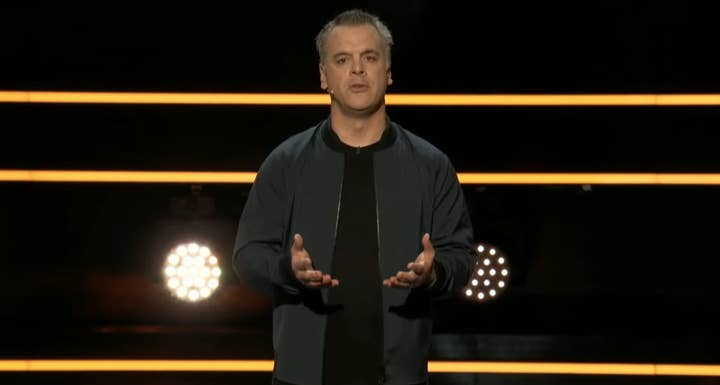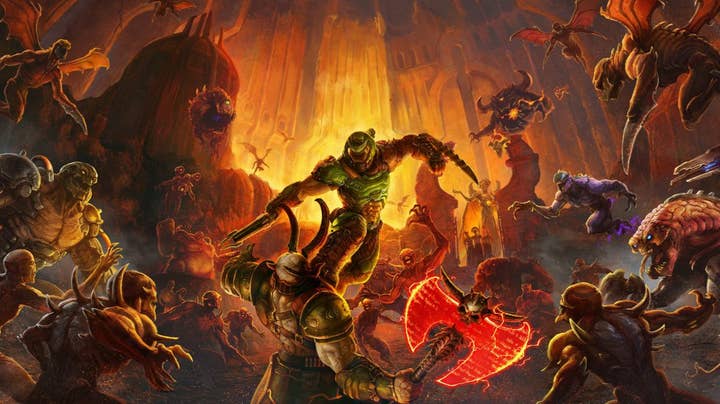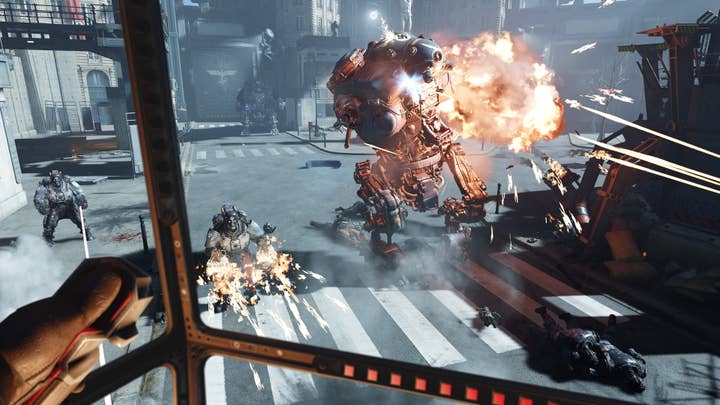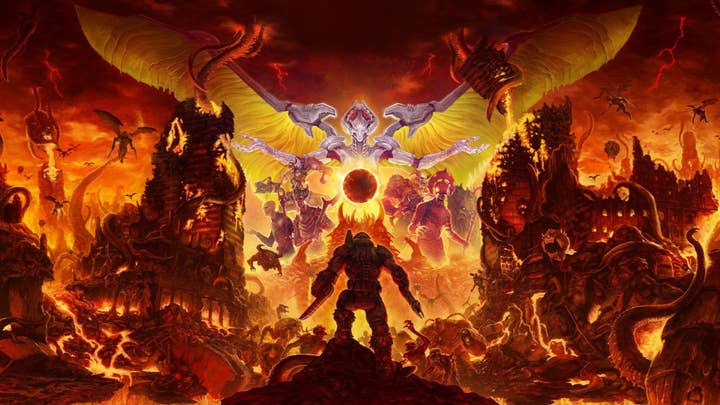Bethesda: "We are bringing some people to Nintendo Switch"
Pete Hines discusses building new IP, the potential of streaming, and its recent love for Nintendo
There was an element of uncertainty about Bethesda's E3 2019. The company had already warned fans not to expect last year's big reveals: the sixth Elder Scrolls or new IP Starfield. So what did that leave exactly? Some new footage of the next Wolfenstein and Doom? Updates to Fallout 76? Surely there has to be more to justify a full blown E3 press conference?
Well, as it turned out Bethesda did have a few surprises. Namely, new horror IP GhostWire Tokyo from Tango Gameworks, and story-driven action game Deathloop from Arkane Studios. These two reveals mean that, coupled with Starfield, its upcoming release slate is looking decidedly different. That's three new IPs for a company that hasn't released one since The Evil Within in 2014. Is it a coincidence, or deliberate strategy?
"It's not really mandated in either direction," says Pete Hines, SVP of global marketing and communications. "It's about: What do you want to make and what does it line up with? We didn't go to ZOS [Zenimax Onine Studios] and say: 'You need to make a Commander Keen game, figure it out' [a mobile version of the classic IP was also announced at E3]. They said: 'Hey, nobody is doing anything with Commander Keen, we have an idea, can we do this? Here is what it would be.' It has to come from that direction as opposed to me mandating to Arkane that they have to do X or Y. They're like: 'This is what we want to do and we want to call it Deathloop.'"

Bethesda hasn't had the best of luck with new IP in recent years. Despite promising starts for franchises such as Rage, Dishonored and The Evil Within, the sequels have struggled to set the sales charts alight. For the publisher, the classic brands of Doom, Wolfenstein, Elder Scrolls and Fallout remain its most bankable assets.
"We try to be pretty reasonable in terms of setting expectations," Hines says. "We don't just say that everything gets a forecast of the Skyrim number, because then very few things are getting greenlit. It's like: 'What do you want to make? Who do we think the audience is? What do we think we can do? How long is it going to take? What is it going to cost?' You come at it from a practical bottom-up approach. You have to make some guesses obviously, but we try and be reasonable whether it's a Rage 2 or a Wolfenstein: Youngblood or something that is no Skyrim, Fallout or Doom. We don't treat everything as it has to be Skyrim or we won't do it."
Deliberate or not, the focus on new IP does fit with the Bethesda we've seen over the past half a decade. The publisher has shown an experimental streak by investing in new technology and platforms, and then continuing to invest in them beyond that. Take Nintendo Switch; most AAA third-party publishers have been cautious in their support for the hybrid console. It is an understandable approach when you consider the popular notion that 'only Nintendo games sell on Nintendo consoles.' Indeed, if you look at the top ten Switch games in the US, the only third-party game to make the list is still a Mario game.
"We don't treat everything as it has to be Skyrm or we won't do it"
However, Bethesda has been committed to the console, and with more than just ports of older titles. Its efforts to get PlayStation 4 and Xbox One games running on Switch has impressed the console's fans. What's surprising about this isn't so much in how it compares to other big third-party publishers, but how it compares to Bethesda's own history. The company had never supported Nintendo platforms before. I recall asking Hines almost ten years ago whether Bethesda would support Wii, and he answered with a simple "no."
"Well, that was more our philosophy has always been that anything that we are creating, we are happy to bring to as many platforms as will run the game as designed and envisioned," he explains. "The Wii was just not in the same area that the other consoles were at the time. The issue of: 'Well, Wii folks won't play this.' Maybe they would or maybe they wouldn't, but why even speculate? I can never get this game to run on that so it's a moot point.
"Certainly, you're not the wrong in that the level of support we have for Switch looks pretty dramatically different if you compare the last couple of years to the previous 15. I think that's due in large part to what that console could do versus any other Nintendo platform relative to the other platforms we were making games for."

He continues: "One of the things we discovered in talking with Nintendo, is that there's a segment of their audience who plays other kinds of things on their platform that also likes our stuff. And there's a segment of their audience -- and it's a healthy size -- whose entry point into the platform is our title. [Nintendo] can see what is the first thing people play on a new Switch account, and when it's a Doom or a Skyrim, they're like: 'Somebody got a Switch and decided to play your game before anything else.'
"It's interesting to see. It definitely fits an audience that [Nintendo] already has, but it's also clear that we are bringing some new people to [Switch]. I met a guy yesterday who said that the first things they bought on Switch were Doom, Wolfenstein and Skyrim because they are the sort of thing they wanted, and the fact they were on the Switch made them get a Switch."
"What is streaming going to mean in the US? It'll mean something, but what about India? Or China? Or Africa?"
Alongside Switch, Bethesda has also been ramping up its investment in mobile. At E3, it announced that Commander Keen was coming to smartphones, joining brands such as Elder Scrolls and Fallout. It has also been investing in less established technology, too. It was one of the early supporters of VR with versions of Doom, Skyrim and Fallout. It has continued that investment, and its next VR game -- Wolfenstein Cyberpilot -- is out later this month. Again, the level of commitment to the technology has gone beyond most other AAA publishers.
"I don't know if you remember sitting here a few years ago when the sentiment seemed to be leaning towards VR replacing all form of gaming," Hines recalls. "I'm here thinking: 'No, there's not a chance in hell.' I can't sit next to my wife with a headset on and completely tune her out for hours at a time. It's done what I thought it was going to do.
"It was, is, in its infancy, it's going to continue to grow and evolve, the hardware is going to get better, the games are going to get better. We have a VR title, one we're talking about this year. It's not like every game that we presented [at E3] had a VR element to it. It goes back to one of the ideas that we have: What are the games that we are making? is there a VR element that makes sense for that? If yes, we'll consider it. If not, let's move on."
He continues: "Doom did really well. Skyrim did crazy well. With Wolfenstein, they had an idea they wanted to try. As Jerk [Gustafsson, executive producer at MachineGames] said on stage at E3, the Arkane guys had some interest in working with them on the VR thing and we decided to give it a go."

And now onto the next area of experimentation: cloud streaming. Bethesda has been developing its own tech [Orion, which you can read about here] and it's already promoting Doom Eternal for Google Stadia. Hines is cautious on the immediate potential of streaming, but believes it will enable the firm to unlock a huge number of customers it's simply not talking to.
"It feels a lot like the early days of VR," Hines notes. "There's tremendous potential there, but I also don't think that a year from now no-one is going to play games on console or PC anymore because they stream everything. It will be a growth of some amount, but the potential it has relative to everything else is one of a tremendous reduction of barriers to entry.
"When you have folks who say: 'I'm never going to play Doom Eternal because I don't have a gaming PC and I'm not spending $400 for a console,' that's the end of the conversation. They're just not someone that I can reach out to for Doom Eternal. But if you know that on basically anything that has a screen you can suddenly stream a AAA, 60fps, 4K title, you're now a customer in a way that you simply hadn't been before.
"The number of people that applies to is hundreds of millions or billions. Now I'm not saying that everybody is going to convert to a $60 AAA consumer, but you're just opening yourself up to a lot more folks who don't have to jump through all the hoops of upgrading a PC all the time, or getting the new console, or paying for that big upfront cash outlay before the even buy a single game. I can jump in and watch someone streaming the game, click on a button and have a free trial, make a purchase, have a game that I can take wherever I go. That's a pretty big difference from anything else we've seen.
"I've been asked a lot: 'Do you think this makes consoles go away?' Firstly, I really don't, and number two... A lot of folks who think about streaming are like: 'Well, what's it going to mean in the US?' It'll mean something, but what about India? Or China? Or Africa? These are places where people have a cellular signal, and that's enough for them to start playing crazy high-end video games that were never even remotely possible before.
"Yes, it's got applications in the US. It'll grow that marketplace some significant amount, but you've got places where your game console penetration might as well be zero. And suddenly it's like: 'Hey, if you have a phone with a screen, then you can play frigging anything.' That's huge."

